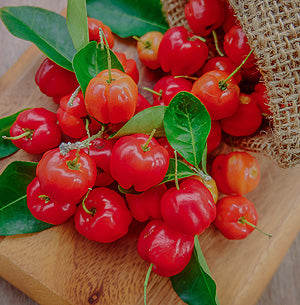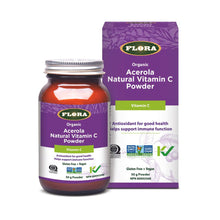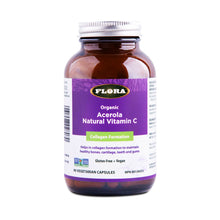Info: Available in 90 Veg. Capsules or a 50 g Powder
Acerola contains an amazing amount of whole food Vitamin C – just one small scoop (provided) of its concentrated powder delivers fourteen times more vitamin C than an orange – and it's been shown to be better absorbed and able to stay in the system longer before being excreted than synthetic forms of ascorbic acid. It also contains other beneficial phytonutrients like phenolic acids, flavonoids, anthocyanins, and carotenoids.
Info: Available in 90 Veg. Capsules or a 50 g Powder
Acerola contains an amazing amount of whole food Vitamin C – just one small scoop (provided) of its concentrated powder delivers fourteen times more vitamin C than an orange – and it's been shown to be better absorbed and able to stay in the system longer before being excreted than synthetic forms of ascorbic acid. It also contains other beneficial phytonutrients like phenolic acids, flavonoids, anthocyanins, and carotenoids.
Product Notes:

Acerola also provides Vitamins A, B1, B2 and B3, as well as multiple bioflavins and carotenoids, which have powerful antioxidant properties exceeding those of other tropical fruits.
Flora's powdered form comes from the juice pressed from acerola fruit organically grown in Brazil. You can either reconstitute it and drink it on its own, or simply add it to smoothies and juice blends.
Acerola has several other names, including the Barbados or West Indian cherry, and they indeed looks quite a lot like some types of regular cherries North Americans are familiar with, as you can see here – although their tart, tangy taste is a bit more sour.
Also see Amla Powder.
Ingredients:
Powder: Organic Acerola (Malpighia glabra) fruit juice powder, providing 300 mg Vitamin C per gram.
Capsules: 333 mg Organic Acerola (Malpighia glabra) fruit juice powdered, providing 100 mg Vitamin C per gram per capsule.
Non-medicinal ingredients: Hypromellose, microcrystalline cellulose, magnesium stearate.
Vegan, Non-GMO, and Gluten-Free. Kosher Check certified.
Suggested Usage:
Powder:
Children between the ages of 4 and 13 years old: Dissolve 1.5 g (3/4 of a scoop) powder in water (or other beverages) and drink once daily.
Adults & Adolescents 14+ years old: Dissolve 3 g (1 heaping scoop) powder in water or other beverages. Take once daily.
Capsules:
Children or Adolescents 9 to 13 years old: Take one capsule one to two times daily.
Adults & Adolescents 14+ years old: Take two capsules one or two times daily.
Store bottles at room temperature, in a dark place without direct sunlight, away from children. Replace cap tightly after each, since acerola powder readily absorbs moisture when exposed to air.
Warnings:
Risk Information: None.
Health Canada Natural Product Numbers: 80093508 for powder, 80136551 for capsules.
Supporting Science:
"Acerola, an untapped functional superfruit: a review on latest frontiers." Journal of Food Science and Technology, 2018.
"Acerola juice - The richest known source of Vitamin C: A clinical study in infants." The Journal of Pediatrics. 1956.
"Absorption and excretion of ascorbic acid alone and in acerola (Malpighia emarginata) juice: comparison in healthy Japanese subjects." Biological and Pharmaceutical Bulletin 2011.
"Antioxidant compounds and antioxidant activity in acerola (Malpighia emarginata DC.) fruits and derivatives." Journal of Food Composition and Analysis. 2008.
"Wild fruits and pulps of frozen fruits: antioxidant activity, polyphenols and anthocyanins." Cienca Rural. 2006.
Product Options:




